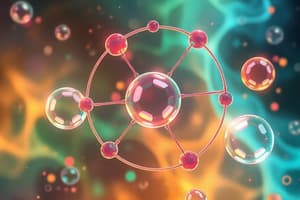Podcast
Questions and Answers
What is the net electric charge of a polyatomic ion?
What is the net electric charge of a polyatomic ion?
- A combination of metal atoms
- A group of atoms bonded together with a net electric charge (correct)
- Always negative
- Always positive
What is the valence number of an atom in its elemental form?
What is the valence number of an atom in its elemental form?
- 0 (correct)
- Varies depending on the atom
- +1
- -1
Which of the following polyatomic ions has a charge of -2?
Which of the following polyatomic ions has a charge of -2?
- Ammonium (NH4+}
- Carbonate (CO32-) (correct)
- Hydroxide (OH-)
- None of the above
What is the valence number of nitrogen in ammonia (NH3)?
What is the valence number of nitrogen in ammonia (NH3)?
What is the sum of the valence numbers of the individual atoms in a neutral compound?
What is the sum of the valence numbers of the individual atoms in a neutral compound?
What is the valence number of carbon in methane (CH4)?
What is the valence number of carbon in methane (CH4)?
Study Notes
Polyatomic Ions
- A polyatomic ion is a group of atoms bonded together that has a net electric charge.
- They are also known as complex ions.
- Polyatomic ions are typically formed from a combination of nonmetal atoms.
Common Polyatomic Ions
- Ammonium (NH4+)
- Carbonate (CO32-)
- Hydroxide (OH-)
- Nitrate (NO3-)
- Phosphate (PO43-)
- Sulfate (SO42-)
Valence Numbers (Oxidation States)
- A valence number, also known as an oxidation state, is a number that represents the number of electrons an atom gains or loses to form a bond.
- Valence numbers can be positive or negative.
- The sum of the valence numbers in a neutral compound is zero.
Rules for Assigning Valence Numbers
- Atoms in their elemental form: Valence number of zero.
- Monatomic ions: Equal to the charge of the ion (e.g., Na+ = +1, Cl- = -1).
- Polyatomic ions: The sum of the valence numbers of the individual atoms in the ion.
- Compounds: The sum of the valence numbers of the individual atoms in the compound is zero.
Examples of Valence Numbers
- Sodium (Na): +1
- Chlorine (Cl): -1
- Oxygen (O): -2
- Nitrogen (N): -3 in ammonia (NH3), +5 in nitrate (NO3-)
- Carbon (C): +4 in methane (CH4), -4 in methide (CH3-)
Polyatomic Ions
- A polyatomic ion is a group of atoms bonded together with a net electric charge, also known as a complex ion.
- Polyatomic ions are typically formed from a combination of nonmetal atoms.
Examples of Polyatomic Ions
- Ammonium (NH4+)
- Carbonate (CO32-)
- Hydroxide (OH-)
- Nitrate (NO3-)
- Phosphate (PO43-)
- Sulfate (SO42-)
Valence Numbers (Oxidation States)
- A valence number, also known as an oxidation state, represents the number of electrons an atom gains or loses to form a bond.
- Valence numbers can be positive or negative.
- In a neutral compound, the sum of the valence numbers is zero.
Rules for Assigning Valence Numbers
- Atoms in their elemental form have a valence number of zero.
- Monatomic ions have a valence number equal to the charge of the ion.
- Polyatomic ions have a valence number equal to the sum of the valence numbers of the individual atoms in the ion.
- In a compound, the sum of the valence numbers of the individual atoms is zero.
Examples of Valence Numbers
- Sodium (Na): +1
- Chlorine (Cl): -1
- Oxygen (O): -2
- Nitrogen (N): -3 in ammonia (NH3), +5 in nitrate (NO3-)
- Carbon (C): +4 in methane (CH4), -4 in methide (CH3-)
Studying That Suits You
Use AI to generate personalized quizzes and flashcards to suit your learning preferences.
Description
Learn about polyatomic ions, also known as complex ions, and valence numbers or oxidation states in chemistry. Understand how polyatomic ions are formed and review common examples.



